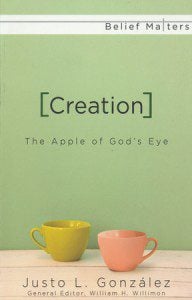 As Christians we are taught much about the presence of God in creation and in our lives. Less is said about God’s absence in creation. Justo L. González ([Creation] The Apple of God’s Eye) digs into both God’s presence and God’s absence. There is much that we could discuss in these two short chapters, but here I will highlight only two points.
As Christians we are taught much about the presence of God in creation and in our lives. Less is said about God’s absence in creation. Justo L. González ([Creation] The Apple of God’s Eye) digs into both God’s presence and God’s absence. There is much that we could discuss in these two short chapters, but here I will highlight only two points.
First, God’s presence in creation is exemplified most significantly in his role in history. Our faith is anchored in history, a progression of events in time and space. God acts in history, through and in relationship with imperfect people, to achieve his desired end. Process is an important part of creation. From the beginning (Genesis 1:26-28) humans were intended to be fruitful and multiply, to tend and “subdue” creation. Unlike the gods of the ancient Near East (and other places) our God is not the answer to the cyclical processes of life, days, months, seasons, years. Humans were not created to supply his needs. “Yahweh is not content with nature and reality as they are but is a god with a purpose, a god who moves in nature and society to certain goals.This is what is meant when we say that Yahweh acts not only in nature but in history.” (p. 66)
González highlights several patterns.
(1) “God chooses and uses the small and the apparently insignificant in order to achieve great things.” (p. 72) This is an important aspect of the Christian understanding of the world and the progress of history. Ordinary people doing the right thing (Ruth for example) move the mission of God forward. “On this basis, one may well say that the most important events in human history, those that move history toward its intended goal, are not the earth-shaking, first-page news items but millions of lesser, less noticeable events of justice, peace, and love.” (p. 72-73)
(2) “God chooses to dwell in particular and unexpected places. … God is present everywhere, yes. But God is particularly present in Jesus Christ.” (p. 73)
(3) “God’s love never fails, even though we may not see it.” (p. 74)
González emphasizes that God works in history through our crooked ways. He isn’t a divine puppet master, pulling the strings to control every event, but he is in control and does act in history. Gen. 50:20 is often quoted in response to unexplained and undeserved pain and suffering. “You intended to harm me, but God intended it for good to accomplish what is now being done, the saving of many lives.” (NIV) This leaves the impression that God orchestrated the brothers actions to achieve his goals. Why?!, is perhaps the largest question here. The CEB (and NCV) gives a better reading: “You planned something bad for me, but God produced something good from it, in order to save the lives of many people, just as he’s doing today.” God is at work in and among his people.
The crooked path of history leads González to consider God’s absence.
 God’s absence in creation. God is not a puppet master or a blessing dispensing machine: just pray and receive. González notes that such a view (pray and receive) “denies and undercuts the sovereignty of God.” The creation story can help us here. On the seventh day God rested from all his work. In Genesis 3 he left the couple in the garden to fend for themselves. The psalmists frequently question God’s absence, even while retaining hope for the future. González cites a number of examples (pp. 80-82). He concludes:
God’s absence in creation. God is not a puppet master or a blessing dispensing machine: just pray and receive. González notes that such a view (pray and receive) “denies and undercuts the sovereignty of God.” The creation story can help us here. On the seventh day God rested from all his work. In Genesis 3 he left the couple in the garden to fend for themselves. The psalmists frequently question God’s absence, even while retaining hope for the future. González cites a number of examples (pp. 80-82). He concludes:
What we have in all these psalms – and in many other places in scripture – is the complaint that God is at rest; God is not like a Coke machine ready to dispense solace whenever we put our coins in the slot. In all of these laments, the psalmist wishes that God were always actively manifesting God’s power but ultimately recognizes that God’s power is not manifested only in the act of creation; it is manifested also in the fact that creation still functions when God rests. In short, God’s power and love are manifested not only in God’s presence but also in God’s apparent absence. (p. 82)
God’s absence is an act of love and part of the plan for creation. It is through God’s absence as well as his presence that we learn to live as God’s children.
We are learning to live as God’s children in a world where the hand of our eternal parent is not always visible, in a world where God has placed us to be stewards of the absent master, to grow as we could not were God always holding our hand and guiding our every step. We are intended to grow after the likeness of our parent, and in our parent’s name to have dominion over creation. (p. 86)
Because God is “absent” we must learn and grow. “Our task is to learn the master’s mind and know the master’s heart.” It is only in this way that we can become faithful stewards and image God in creation.
Does this discussion of God’s absence shed any light on creation and the Christian story?
How does it compare with your understanding of creation?
If you wish to contact me directly you may do so at rjs4mail [at] att.net.
If interested you can subscribe to a full text feed of my posts at Musings on Science and Theology.











